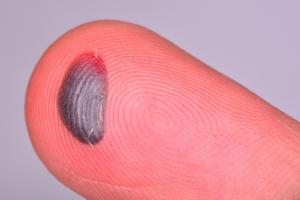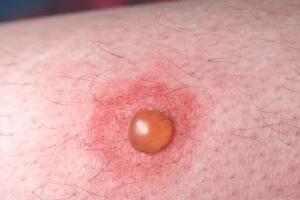Blisters
Blisters are small pockets of fluid that usually form in the upper layers of skin after it's been damaged. Blisters can develop anywhere on the body but are most common on the hands and feet.
Symptoms of blisters
Most blisters are filled with a clear fluid (serum), but may be filled with blood (blood blisters) or pus if they become inflamed or infected.



Blisters can be caused by:
- friction to the skin
- heat - for example, from sunburn or a scald
- contact with chemicals, such as detergent
- medical conditions, such as chickenpox and impetigo
Treating blisters
Most blisters heal naturally after three to seven days and don't need medical attention.
As new skin grows underneath the blister, your body slowly reabsorbs the fluid in the blister and the skin on top will dry and peel off.
Avoid bursting the blister, because this could lead to an infection, or slow down the healing process.
You may choose to cover small blisters with a plaster. Larger blisters can be covered with a gauze pad or dressing that can be taped in place.
Find out more about applying plasters and other dressings.
When to seek medical help
You should see your doctor if you have blisters that:
- you think are infected – an infected blister will be filled with yellow or green pus and may be painful, red and hot
- are very painful
- keep coming back
- are in unusual places, such as on your eyelids, or inside your mouth
- are caused by severe sunburn, burns or scalds or an allergic reaction
Preventing blisters
To avoid getting blisters caused by friction, sunburn or chemicals:
- wear comfortable, well-fitting shoes
- keep your feet dry, for example, with thicker socks
- wear gloves when handling chemicals
- use sunscreen
Blisters caused by a medical condition often can't be prevented and need to be treated by a doctor.
More useful links
The information on this page has been adapted from original content from the NHS website.
For further information see terms and conditions.